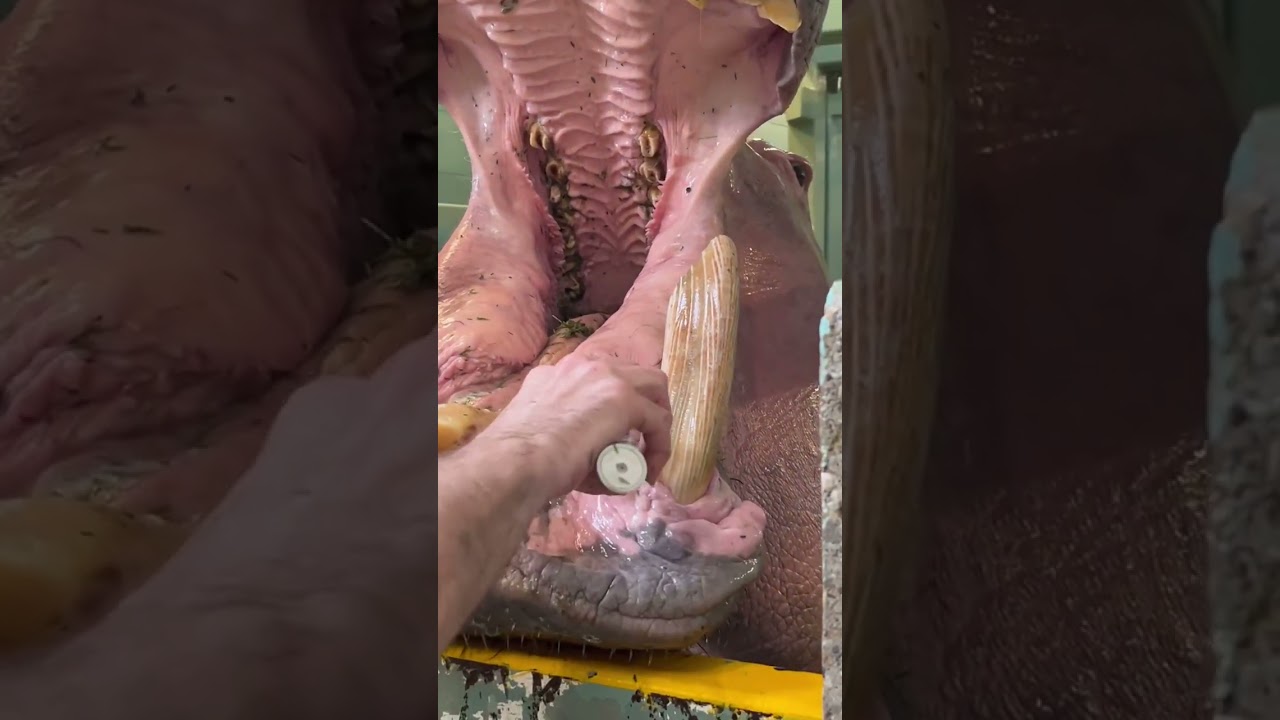– The significance of dental hygiene in hippopotamus health care
– The role of zookeepers in managing and caring for large mammals
– Innovations in veterinary care for captive wildlife
– The importance of public education and awareness in wildlife conservation
– Challenges and solutions in modern zoo management
Dental hygiene plays a critical role in maintaining the overall health of hippopotami, both in the wild and captivity. A standout case highlighting the importance of this aspect of animal care involves a hippopotamus named Lobi, who became known for receiving regular teeth brushing sessions. This not only showcases the dedicated efforts towards ensuring the well-being of captive animals but also serves as an educational tool for zoology enthusiasts and the general public. Hippopotamuses possess large canines and incisors, which, unlike humans, continue to grow throughout their lifetime. Without proper dental care, these teeth can develop problems that might lead to severe health issues or affect the animal’s ability to feed properly.
Zookeepers play a vital role in the daily lives of captive animals, especially large mammals like Lobi, the hippopotamus. Their responsibilities extend beyond feeding and habitat maintenance; they include health assessments and medical care, often involving innovative techniques adapted to each species’ needs. Brushing Lobi’s teeth, for example, requires trust-building between the animal and its caregivers, specialized tools to safely clean the massive teeth, and a deep understanding of hippopotamus behavior to ensure the safety of both the animal and the humans involved. This task exemplifies the commitment of zoo professionals to provide the highest quality of life for the animals in their care.
Innovations in veterinary care have significantly improved the lives of captive wildlife, allowing zoo animals to receive treatments and preventive care that were once difficult or impossible to administer. The development of species-specific approaches, such as the systematic cleaning of a hippopotamus’s teeth, demonstrates the advances in veterinary medicine tailored to the unique needs of zoo animals. These innovations enhance the well-being of animals like Lobi and contribute to the body of knowledge in wildlife medicine, potentially aiding in the care of endangered species and informing conservation strategies.
Public education and awareness are crucial components of wildlife conservation efforts. The story of Lobi getting his teeth brushed serves not only as a glimpse into the complexities of zoo animal care but also as a platform to engage the public in discussions about conservation, the roles of zoos in education, and the intricate needs of different species. By raising awareness about the detailed care zoo animals receive, institutions can foster a deeper understanding and appreciation for wildlife, encouraging support for conservation initiatives and sustainable practices that benefit the environment and its inhabitants.
Modern zoo management faces numerous challenges, from ensuring the health and well-being of animals like Lobi to addressing ethical considerations and conservation goals. Solutions involve continuous improvement in animal husbandry practices, investment in research and development for veterinary care, and active engagement with the global conservation community. Zoos have evolved from merely displaying animals to acting as centers for conservation and education, where every aspect of animal management, including seemingly simple tasks like teeth brushing, is part of a broader effort to sustain biodiversity and inspire future generations.
In summary, the care provided to animals such as Lobi, the hippopotamus reflects broader zoology, veterinary medicine, conservation, and education themes. The attention to dental hygiene, the dedication of zookeepers, the innovations in animal health care, the importance of public awareness, and the challenges of modern zoo management all converge in the daily lives of zoo animals, illustrating the multifaceted approach needed to ensure their health, well-being, and contribution to conservation efforts.
*****
Source Description
Have you ever seen a hippo get its teeth brushed? 😁
Our male hippo ‘Lobi’ is susceptible to gingivitis on his lower canines, and our dedicated Animal Care, Health & Welfare team works hard to maintain his dental health with daily oral care. If Lobi can get his teeth brushed every day, so can you! 🦷
The first step of tooth brushing is a lot of water, filtering out any bits of food that are in Lobi’s mouth. 🚿 A gum massage and inspection by Animal Care Technician Ryan also feels pretty good! ☺️ You might be surprised by Lobi’s toothbrush – it’s human-sized! This toothbrush helps the team reach in close to the gums and give Lobi a deep clean. After that, a syringe of hydrogen peroxide helps to keep Lobi’s teeth and gums beautiful and healthy so he can keep doing what he does best – chomping on food! 🥬🍠🍉
#YourZooYYC #animalcare #animalwellbeing


